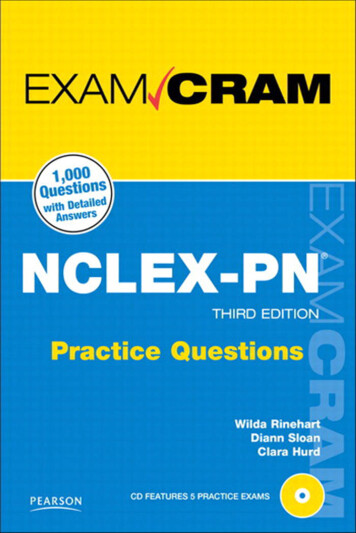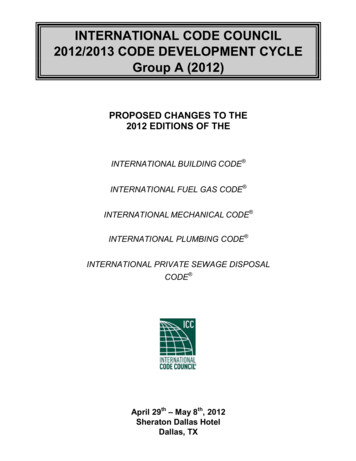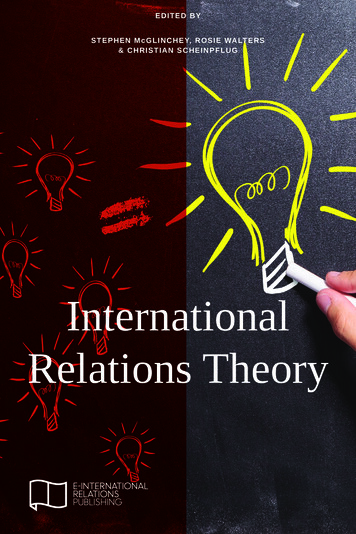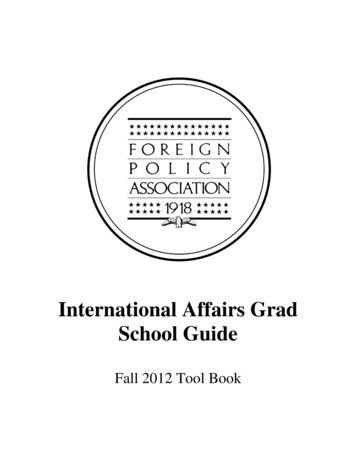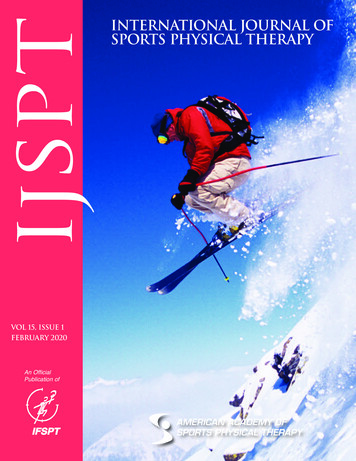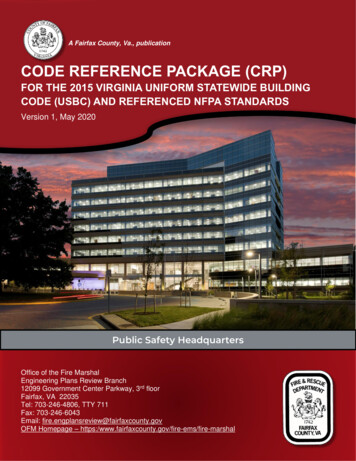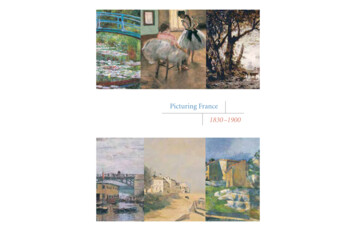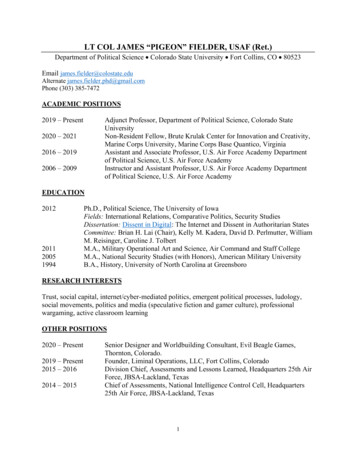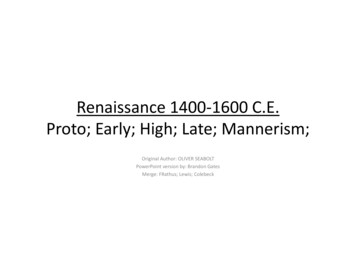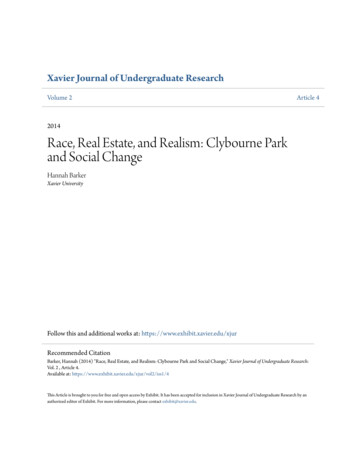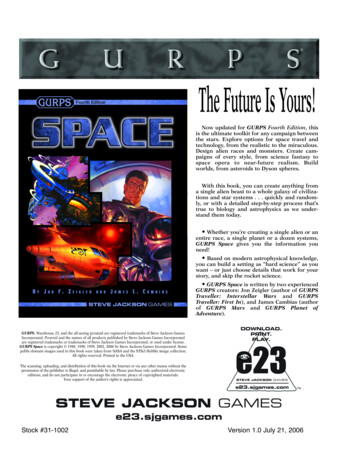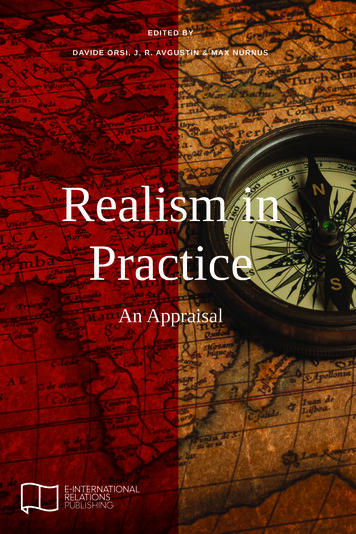
Transcription
ED IT ED B YDAV I DE OR SI, J . R . AVGU ST IN & MA X N U R N U SRealism inPracticeAn Appraisal
This e-book is provided without charge via free download by E-InternationalRelations (www.E-IR.info). It is not permitted to be sold in electronic formatunder any circumstances.If you enjoy our free e-books, please consider leaving a small donation toallow us to continue investing in open access publications:http://www.e-ir.info/about/donate/
iRealism inPracticeAn AppraisalED IT ED BYDAV I D E OR S I, J . R . AV GU S T IN & MA X N U R N U S
iiE-International Relationswww.E-IR.infoBristol, England2018ISBN 978-1-910814-37-6 (paperback)ISBN 978-1-910814-38-3 (e-book)This book is published under a Creative Commons CC BY-NC 4.0 license. Youare free to: Share – copy and redistribute the material in any medium or formatAdapt – remix, transform, and build upon the materialUnder the following terms: Attribution – You must give appropriate credit, provide a link to thelicense, and indicate if changes were made. You may do so in anyreasonable manner, but not in any way that suggests the licensorendorses you or your use.Non-Commercial – You may not use the material for commercialpurposes.Any of the above conditions can be waived if you get permission. Please contact info@e-ir.info for any such enquiries, including for licensing and translationrequests.Other than the terms noted above, there are no restrictions placed on the useand dissemination of this book for student learning materials/scholarly use.Production: Michael TangCover Image: DmitryRukhlenko via DepositphotosA catalogue record for this book is available from the British Library
iiiE-IR Edited CollectionsSeries Editors: Stephen McGlinchey, Marianna Karakoulaki and AgnieszkaPikulicka-WilczewskaCopy-editing: Cameran ClaytonEditorial assistance: Jasmine Chorley and Hayden PaulsenE-IR’s Edited Collections are open access scholarly books presented in aformat that preferences brevity and accessibility while retaining academicconventions. Each book is available in print and digital versions, and ispublished under a Creative Commons CC BY-NC 4.0 license. AsE-International Relations is committed to open access in the fullest sense,free electronic versions of all of our books, including this one, are available onthe E-International Relations website.Find out more at: http://www.e-ir.info/publicationsAbout the E-International Relations websiteE-International Relations (www.E-IR.info) is the world’s leading open accesswebsite for students and scholars of international politics, reaching over 3million unique readers. E-IR’s daily publications feature expert articles, blogs,reviews and interviews – as well as student learning resources. The websiteis run by a registered non-profit organisation based in Bristol, England andstaffed with an all-volunteer team of students and scholars.
ivEditorsDavide Orsi (Ph.D. in Politics and International Relations from CardiffUniversity, 2015) is an Editor-at-Large at E-International Relations. His firstbook Michael Oakeshott’s Political Philosophy of International Relations: CivilAssociation and International Society (Palgrave, 2016) explores the historicaland normative dimension of international society by relating Oakeshott’sphilosophy of civil association to English School theories of internationalrelations. He has published work in journals including the Journal ofInternational Political Theory, Collingwood and British Idealism Studies, theEuropean Legacy, and the British Journal for the History of Philosophy.J. R. Avgustin (Ph.D. in International Relations from University of Ljubljana,2016) is an Editor-at-Large at E-International Relations. He is an AssociateTutor at the University of East Anglia, an independent research consultant forNepal Matters for America and a World Debate Institute Fellow. His mainresearch interests focus on the use of force in international relations,particularly when authorised by the UN Security Council (www.unscramblethesc.org). His publications include articles in Sociology ofDiplomacy: Initial Reading and Acta Diplomatica.Max Nurnus is a PhD student at the Graduate School of International Studiesof Seoul National University and Deputy Articles Editor at E-InternationalRelations.
vAcknowledgmentsThis collected edition would not exist without the support and guidance fromStephen McGlinchey, Editor-in-chief of E-International Relations. We wouldalso like to thank Robert W. Murray for his efforts with bringing clarity ofconcept to this collection. Most of all, we would like to thank all thecontributing authors for their work and their patience.Davide Orsi, J. R. Avgustin and Max Nurnus
viAbstractThe purpose of this collection is to appraise the current relevance and validityof realism as an interpretative tool in contemporary International Relations. Allchapters of the book are animated by a theoretical effort to define theconceptual aspects of realism and attempt to establish whether the traditionstill provides the necessary conceptual tools to scholars of InternationalRelations. The chapters address important issues in contemporary worldpolitics through the lens of realist theory such as the refugee crisis in Europeand the Middle East; the war against ISIS; the appearance of non-state actorsand outlaw agents; the rise of China; cyberwarfare; human rights andhumanitarian law. The collection also provides insights on some of thetheoretical tenets of classical and structural realism. Overall, the collectionshows that, in spite of its many shortcomings, realism still offers an incrediblymultifaceted understanding of world politics and enlightens the increasingchallenges of world politics.
vii
viiiRealism in PracticeContentsINTRODUCTIONDavide Orsi, J. R. Avgustin and Max Nurnus 1.2.3.REALISM: TRAGEDY, POWER AND THE REFUGEE CRISISFelix Rösch & Richard Ned Lebow 16REALISM, POST-REALISM AND ISISFrancis A. Beer & Robert Hariman 16THE PAST, PRESENT AND FUTURE OF REALISMArash Heydarian Pashakhanlou 294.WHEN HARD POWER SHRINKS: THE MIDLIFE CRISIS OF REALISMTony C. Lee 435.REALISM AND POWER TRANSITION THEORY: DIFFERENTBRANCHES OF THE POWER TREECarsten Rauch 55CHINA’S MILITARY MODERNISATION: INTERNATIONAL SYSTEMICCHANGE THROUGH INTERNAL BALANCING?Layla Dawood 72REALISM AND CYBER CONFLICT: SECURITY IN THE DIGITAL AGEAnthony J.S. Craig & Brandon Valeriano 856.7.8.9.REALISM AND PEACEFUL CHANGEAnders Wivel 102REALISM, SMALL STATES AND NEUTRALITYArchie W. Simpson 11910. THE RELUCTANT REALIST: JIMMY CARTER AND IRANRobert W. Murray & Stephen McGlinchey 13111. REALISM: HUMAN RIGHTS FOE?Koldo Casla 14312. WHY IR REALISM PERSISTSM.J. Peterson 156NOTE ON INDEXING 172
ix
xRealism in PracticeContributorsFrancis A. Beer is Professor Emeritus of Political Science at the University ofColorado. His books include: Meanings of War and Peace; Peace AgainstWar: The Ecology of International Violence and Integration and Disintegrationin NATO: Processes of Alliance Cohesion and Prospects for AtlanticCommunity as well as related monographs on The Political Economy ofAlliances and How Much War in History. He has also co-edited (with RobertHariman) Post-Realism: The Rhetorical Turn in International Relations. Hispresent interests centre on meaning, metaphor and myth in internationalrelations with a particular concern for war and peace.Koldo Casla earned his PhD at King’s College London in July 2017, wherehe has studied why Western European states promote international humanrights norms. His most recent publications are ‘The rights we live in:protecting the right to housing in Spain’ (IJHR, 20:3, 2016) and ‘Dear fellowjurists, human rights are about politics, and that’s perfectly fine’ (chapter inedited volume Can human rights bring social justice?, 2015).Anthony J.S. Craig is a PhD candidate in the Department of Politics andInternational Relations at Cardiff University, and a member of the ResearchSchool on Peace and Conflict at the Peace Research Institute Oslo. His PhDresearch investigates developments in national cyber capabilities across theinternational system.Layla Dawood is a Professor at the University of the State of Rio de Janeiro(UERJ). She holds a PhD in International Relations from the PontificalCatholic University of Rio de Janeiro. She has published papers, bookchapters and articles on different issues of the International Security field,including Latin American Security. Her research interests encompassInternational Relations Theory and International Security with a focus onbalancing, nuclear policy and non-proliferation.Robert Hariman is Professor of Communication Studies at NorthwesternUniversity. He is the author of Political Style: The Artistry of Power and twovolumes co-authored with John Louis Lucaites: No Caption Needed: IconicPhotographs, Public Culture, and Liberal Democracy, and The Public Image:Photography and Civic Spectatorship. His other publications include editedvolumes on popular trials, prudence, post-realism, and the texture of politicalaction. His work has been translated into French and Chinese. Together withJohn Louis Lucaites he maintains a blog: Nocaptionneeded.com.
xiRichard Ned Lebow is Professor of International Political Theory in the WarStudies Department of King’s College London, Bye-Fellow of PembrokeCollege, University of Cambridge and the James O. Freedman PresidentialProfessor (Emeritus) of Government at Dartmouth College. His most recentbooks are National Identifications and International Relations (Cambridge2016), Avoiding War, Making Peace (Palgrave 2017), and Max Weber andInternational Relations (Cambridge 2017).Tony Chih-Chi Lee is postdoctoral researcher at the Institute of Asia andAfrican Studies of Humboldt Universität zu Berlin where he pursues ahabilitation (German certificat for professorship). His research interests rangefrom area studies (China, in particular) to political psychology. He isparticularly keen on deciphering psychological incentives behind decisionmakings of political leaders or/and leadership groups. His most recent articleCold Case: Re-investigate the group dynamics of the Chinese Leadership inthe 1989 Tiananmen Incident will be published by the American Journal ofChinese Studies.Stephen McGlinchey is Senior Lecturer of International Relations at theUniversity of the West of England, Bristol. His most recent booksare International Relations (E-International Relations 2017) and US ArmsPolicies Towards the Shah’s Iran (Routledge 2014). He is the Editor-in-Chiefof E-International Relations (www.E-IR.info).Robert W. Murray is Managing Director of the Government Affairs and PublicPolicy Practice Group at Dentons Canada LLP and a Research Fellow at theUniversity of Calgary’s Centre for Military, Security and Strategic Studies. Hisrecent publications include Protecting Human Rights in the 21st Century withAidan Hehir (Routledge 2017), Seeking Order in Anarchy: Multilateralism asState Strategy (University of Alberta Press 2016), and System, Society andthe World: Exploring the English School of International Relations 2nd Edition(E-International Relations 2015).Arash Heydarian Pashakhanlou is Assistant Professor in War Studies at theSwedish Defence University. He has published extensively on realism and hislatest monograph Realism and Fear in International Relations: Morgenthau,Waltz and Mearsheimer Reconsidered was published by Palgrave.M.J. Peterson is a Professor of Political Science at the University ofMassachusetts Amherst (USA). Her research focuses on formal organisationsand informal practices through which governments pursue cooperative effortsto address cross-border problems. She is the author of International Regimesfor the Final Frontier (2005), Managing the Frozen South: The Creation and
xiiRealism in PracticeEvolution of the Antarctic Treaty Regime (1988) and The General Assemblyin World Policies (1986). She has also authored articles in the AmericanPolitical Science Review, the American Journal of International Law,International Organization and Review of International Organizations.Carsten Rauch is Research Fellow at the Peace Research Institute Frankfurt(PRIF). He received his PhD from Goethe University, Frankfurt in 2013. Hisresearch has dealt with the rise and fall of great powers, revisionism in theinternational system, power transition theory and more generally IR theory, aswell as Indian foreign policy. His book publications include Die Theorie desDemokratischen Friedens (Campus, 2005), and Das Konzept des friedlichenMachtübergangs (Nomos, 2014). He has also published articles in SecurityStudies, International Area Studies Review, European Review of InternationalStudies and Zeitschrift für Friedens- und Konfliktforschung.Felix Rösch is Senior Lecturer in International Relations at CoventryUniversity. He works on encounters of difference in transcultural andintercultural contexts at the intersection of classical realism and criticaltheories. He has published articles in Review of International Studies,European Journal of International Relations, International StudiesPerspectives and Ethics & International Affairs. His most recent booksinclude The Concept of the Political (2012), Émigré Scholars and the Genesisof International Relations (2014), and Power, Knowledge, and Dissent inMorgenthau’s Worldview (2015).Archie W. Simpson is a teaching fellow in Politics and InternationalRelations at the University of Bath. He has previously taught at the Universityof Aberdeen, University of St Andrews, University of Stirling and University ofNottingham. He is a founding member of the Centre for Small State Studiesat the University of Iceland and is on the international editorial board of thenew journal Small States and Territories. His main research interests are insmall states, international security, grand strategy and European politics.Brandon Valeriano is the Donald Bren Chair of Armed Politics at the MarineCorps University and a Reader in the Department of Politics and InternationalRelations at Cardiff University. He also serves as an adjunct fellow for theNiskanen Center. His two most recent books are Cyber War versus CyberReality at Oxford University Press (2015) and Russia’s Coercive Diplomacyat Palgrave (2015).Anders Wivel is a Professor of Political Science at the University ofCopenhagen. His research interests include political realism, power politicsand foreign policy, in particular the foreign policy of small states. His articles
xiiihave appeared in various journals including Cooperation and Conflict, Journalof Common Market Studies, Security Dialogue, Cambridge Review ofInternational Affairs, Journal of International Relations and Development andEuropean Security. His most recent book is The Routledge Handbook ofScandinavian Politics (Routledge, 2017) (co-edited with Peter Nedergaard).
1Realism in PracticeIntroductionThe Practice of Realism in InternationalRelationsDAV I DE O R S I, J . R . AV GU S T IN A N D MA X N U R N U SRealism in International Relations can be considered as the discipline’s oldesttheory, having its first advocate in Thucydides, who presented the idea thatpower trumps justice and morality in The Peloponnesian War. Among manyothers, Machiavelli and Hobbes, first, E.H. Carr and H. Morgenthau, then,offered to their readers provocative and eternal questions that still challengeour times (Boucher 1998, 47–170; Molloy 2006). In a way, realism (also withits more contemporary versions with Waltz and Mearsheimer) can beconsidered as one of the most enduring approaches in IR. One of the reasonsfor this is that ‘it sets itself up as a no-nonsense practical science ofinternational politics’ (Sutch and Elias 2007, 42). In realism, all events ininternational politics make sense and can be explained through relativelyclear and immediate principles. For these reasons, realism not only remains acornerstone of International Relations theory (Gold and McGlinchey 2017,46–49), but also a thriving approach in the broad fields of political studies andpolitical theory (Bell 2017). Classical realism has shaped the way in which therelations between states over the centuries have been understood and stillinfluences policymakers today. According to some observers, realism hasdetermined the foreign policies of both Barack Obama (Pillar 2016) andDonald Trump (Cole 2017).On the other hand, realism is often challenged by the changing circumstancesof contemporary world politics. For example, the notion of timeless principlesand human nature, which are ‘unaffected by the circumstances of time andplace’ (Morgenthau 1985, 10–11), has often been considered as anabstraction, more useful to understand realism as a theory than world politics.Among many other possible issues with realism, recent events such as therise of non-state actors and non-conventional confrontation betweeninternational agents made the often state-centric realist view more and morefragile. Already in a 1995 article, Ethan Kapstein argued that realism in
Introduction2International Relations might be ‘deeply and perhaps fatally flawed’ yet‘continues to define the discipline’ (1995, 751). Not long after, Jeffrey Legroand Andrew Moravcsik also saw a dominant role of Realist voices, while atthe same time perceiving realism ‘in trouble’ and ‘in need of reformulation’(1999, 5, 54). Today, realism is again accused of being grounded on‘astonishingly bold’ claims and ‘empirically unprovable’ tenets (Motyl 2015)and of being unable to explain the complex reality of world politics.The purpose of this collection is not to solve this dilemma; it is not to establishwhether realism should be considered as the bearer of eternal truthsregarding world politics or whether it should be abandoned. This book takesinstead a more limited and nuanced approach, by appraising the currentrelevance and validity of realism as an interpretative tool in contemporaryInternational Relations. In this spirit, all chapters of the book are animated notonly by a theoretical effort to define the conceptual aspects of realism, butalso by the aim of finding whether the tradition still provides the necessaryconceptual tools to practitioners and scholars of International Relations.In the chapter that opens the volume Lebow and Rösch present some of theperennial ideas that have shaped the realist tradition in international thought.By challenging the common reading that sees profound differences amongvarious schools of realism (structural, classical, neo-positivist, and more),Lebow and Rösch find some essential elements of realism. These are the‘tragic vision of life’ and the controversial relation between ethics and power.However, Lebow and Rösch not only offer this important interpretation butalso claim that, on this ground, realism can still enlighten our understandingof world politics, by offering critical insights on the refugee crisis in Europeand the Middle East.In the second chapter, Beer and Hariman show the persistent relevance ofrealist thinking in International Relations with regard to the rise of ISIS. To thisend, they take a different approach from that of Lebow and Rösch andpresent an updated version of realism: post-realism, which seeks to offer amuch more accurate account of the immaterial and cultural aspects ofinternational politics.Several contributions try to assess whether realism still offers a valuableinstrument for the understanding of the world after the end of the Cold War.Pashakhanlou (Chapter 3) evaluates the explanatory power of Waltz’sdefensive realism and Mearsheimer’s offensive realism in the light of thechallenges of the allegedly unipolar post-Cold War world. In this light, a seriesof chapters addresses the rise of China in the post-Cold War era. Lee(Chapter 4) identifies the main challenge to realism in the rise of China’s soft
3Realism in Practicepower and in the theoretical shortcomings of the conception of power as it isdefined by various realist schools. Chapter 5 by Carsten Rauch examines thecase of China by comparing the realist approach to Power Transition Theory.Dawood (Chapter 6) analytically examines the Chinese balancing roletowards the USA, with particular regard to the problem of the South-ChinaSea and the building up of China’s naval power.War has always been at the centre of realist theory. The activities of hackersduring elections and the disruptions they caused against public services andgovernments (for example the attack against the NHS in Britain in May 2017)show the growing importance of this new important level of confrontationamong states, which is examined in the contribution (Chapter 7) by Craig andValeriano on cybersecurity.In Chapter 8 Anders Wivel focuses on ‘peaceful change’ as an instrument ofinternational politics in its relation to power. Despite being recognised by E.H.Carr as one of the fundamental problems in international morality and law(see below), realist thinking has rarely considered the problem. In Chapter 9,Simpson examines the issue of small states and neutrality, challenging thetraditional realist interest in great powers. By offering an historical excursusfrom the Melian dialogue to the post-Cold War era, the author examines theplace of neutrality in contemporary politics, shaped by the return of multipolarpolitics.One of the characters of realist theory is to identify a tension between ideals,and normative frameworks, and political reality. In contemporary politics, thelingua franca that shapes our normative expectations towards political actorsis set by human rights. McGlinchey and Murray examine the American policyin the Middle-East during the Carter presidency and show the continuoustension between systemic pressure and ideals, including human rights anddisarmament (Chapter 10). On a more theoretical level, and in the light of thegrowing literature of the politics of international law, Casla challenges thistraditional view and finds instead that traditional realism offers substantialarguments for the relevance of International Human Rights Law in worldpolitics (Chapter 11). The conclusive contribution (Chapter 12) by Petersonidentifies in the persistence of power politics the main reason of thecontinuing relevance of realism in international relations.All the chapters included in this volume rise from an urgent practical need:that of understanding the changing landscape of contemporary internationalpolitics. The relative decline of American power, the ambivalent Russianreturn and the rise of China, as well as the threats posed by non-state actorsand new forms of military might are the problem felt by scholars in
Introduction4international politics as well as by the educated public. Notwithstanding themany critiques that the chapters of this volume advance against classicalrealist thinkers, what emerges is that realism offers an incredibly multifacetedunderstanding of world politics and enlightens the increasing challenges ofworld politics.ReferencesBell, Duncan. ed. 2008. Political Thought and International Relations.Variations on a Realist Theme. Oxford: Oxford University Press.Bell, Duncan. 2017. “Political Realism and International Relations.”Philosophy Compass 12(2): 1–12.Boucher, David. 1998. Political Theories of International Relations. Oxford:Oxford University Press.Cole, Phil. 2017. “Trumpism and the Future of International Politics: TheReturn of Realism.” E-International Relations future-of-international-politics/) accessed 25/06/2017.Gold, Dana and Stephen McGlinchey. 2017. “International Relations Theory.”International Relations. Edited by Stephen McGlinchey, 46–56. Bristol:E-International Relations.Kapstein, Ethan B. 1995. “Is Realism Dead? The Domestic Source ofInternational Politics.” International Organization 49 (4): 751–774.Legro, Jeffrey W and Andrew Moravcsik. 1999. “Is Anybody Still a Realist?”International Security 24(2): 5–55.Molloy, Sean. 2006. The Hidden History of Realism. A Genealogy of PowerPolitics. London: Palgrave.Morgenthau, Hans. 1985. Politics among Nations. The Pursuit of Power andPeace. Chicago, IL: Chicago University Press.Motyl, Alexander J. 2015. “The Surrealism of Realism: Misreading the War inUkraine.” World Affairs lismrealism-misreading-war-ukraine, accessed on 25/06/2017).
5Realism in PracticePillar, Paul. 2016. “Obama the Realist.” National Interest a-the-realist-15479?page show,accessed 25/06/2017).Sutch, Peter and Juanita Elias. 2007. International Relations: The Basics.London: Routledge.
Realism: Tragedy, Power and the Refugee Crisis61Realism: Tragedy, Power andthe Refugee CrisisFE L IX R ÖSC H & R IC H A R D N E D LE B OWSince the end of the Cold War realism has returned to its roots. Realistscholars show renewed interest in their paradigm’s foundational thinkers, theirtragic understanding of life and politics, their practical concern for ethics, andtheir understanding of theory as the starting point for explanatory narrativesor forward-looking forecasts that are highly context dependent. In thischapter, we do not attempt to map these recent re-readings. Despite theirdifferent perspectives on world politics, the writings of Thucydides, NiccolòMachiavelli, E. H. Carr, Reinhold Niebuhr, Arnold Wolfers, John Herz, HansMorgenthau, and Hannah Arendt demonstrate a remarkable unity of thought,as they have been driven by similar concerns about ‘perennial problems’(Morgenthau 1962, 19). One of these problems is the depoliticisation ofsocieties. Realists were concerned that, in modern societies, people could nolonger freely express their interests in public, losing the ability to collectivelycontribute to their societies. Consequently, realism can be perceived as acritique of and ‘corrective’ (Cozette 2008, 12) to this development.To introduce this perspective of realism and to understand the differencesbetween neorealism and realism (also Bell 2017), we particularly focus onmid-twentieth century realists which are often now identified as classicalrealists in the literature. This micro-lens on realism is possible because, dueto their common war and even migration experiences, their thoughts resonatewith each other particularly well. In the first section, we outline realism’s tragicunderstanding of life and how to deal with it. This is followed in the secondsection by an introduction into one of the core realist concepts – power –before arguing that realism does not promote a world of nation-states. Finally,we discuss the current refugee crisis through a realist perspective.
7Realism in PracticeThe Tragic Vision of LifeMid-twentieth century realists were a diverse group of scholars. Although theirgeographical centre was in the United States, with exceptions like Carr andGeorg Schwarzenberger in the United Kingdom and Raymond Aron inFrance, many of them were émigrés from Europe, who had been forced toleave due to the rise of fascism and communism. Although they shared acommon humanistic worldview in the sense that they had received similarextensive secondary schooling in liberal arts and they believed that peoplecan only experience themselves as human beings by engaging with others inthe public sphere, their diversity is also evidenced in their wide range ofprofessions. Given that IR was only gradually institutionalised in Europe whenthe first chair was set up in light of the horrors of World War I at the universityin Aberystwyth, Wales in 1919, none of them was trained as an IR scholar.Instead, they were historians, sociologists, philosophers, lawyers, and eventheologians. Only retrospectively were many of them linked to IR. EvenMorgenthau, arguably the most well-known realist, held a professorship forpolitical science and history – not for international politics. Despite thisdiversity, however, mid-twentieth century realists agreed on a tragic vision oflife; a view they shared with many of their predecessors (Lebow 2003;Williams 2005). This is because people, and more so leaders, have to makedecisions on the basis of incomplete information, deal with unpredictability oftheir actions, and cope with irreconcilable value conflicts within and amongsocieties. Above all, they recognise that leaders must sometimes resort tounethical means (e.g. violence) to achieve laudable ends, and without priorknowledge that these means will accomplish the ends they seek.This tragic outlook is understandable if we consider the contexts in whichclassical realists wrote. Thucydides lived during the times of thePeloponnesian War in which Athens lost its pre-eminence in the ancientGreek world. Machiavelli’s life was also influenced by repetitive conflicts inwhich papal, French, Spanish, and other forces aimed to seize control overNorthern Italy during the Renaissance Wars (1494–1559). Modern realistsfinally experienced with the rise of ideologies the climax of a developmentthat had started almost 200 years earlier. Since the Age of Enlightenmentculminating in the French Revolution, people were freed from religiousstraightjackets, but at the same time had lost a sense of community thatideologies like nationalism, liberalism, or Marxism could only superficiallyrestore, and often only at the cost of violent conflicts. Realists shared publicsentiments that losing this sense of community caused a decline of commonlyaccepted values as exemplified in the German debate on a cultural crisisduring the early decades of the twentieth century and it made them moresusceptible to the temptations of ideologies. This is because ideologiesprovide what Arendt (1952, 469) called ‘world explanations’, enabling people
Realism: Tragedy, Power and the Refugee Crisis8to channel their human drives into them.John Herz (1951) argued that the drive for self-preservation, which ensuresthat people care about their survival in the worl
iv Editors Davide Orsi (Ph.D. in Politics and International Relations from Cardiff University, 2015) is an Editor-at-Large at E-International Relations. His first book Michael Oakeshott’s Political Philosophy of International Relations: Civil Association and International Society (Palgrave, 2016) explores the historical and n
